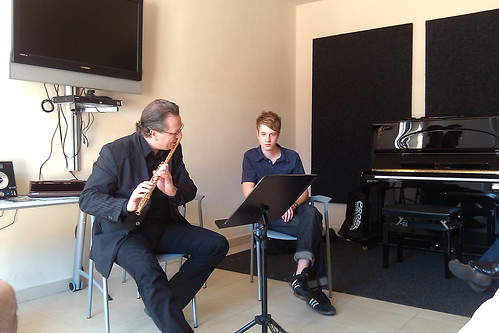IU East Music Department goes on European Tour
RICHMOND, Ind. – Seven Indiana University East students studied abroad throughout Europe as part of a broad-based culture and non-linear music history and composition courses. The students visited two main city epicenters of music – Venice and Vienna – while they traveled. Students left for Europe on May 24 and returned June 7.
Students who traveled to study abroad were Jessica Smith of Liberty, Ind., Evan Livingston, Nikolas Hall and Alunee Tran, all of Richmond, Ind., Nathaniel Akers of Lewisburg, Ohio, Catherine Stout and Justin Moore, both of Hagerstown, Ind.
The composition course students traveled to Italy from May 17 until joined by students in the “Music Capitals of Europe: Venice & Vienna” summer course on May 26. All students returned home June 7. Elliott Miles McKinley, assistant professor of music and director of the program, is the instructor for the courses.
The composition students – Nate Akers, Evan Livingston, Nikolas Hall, and Justin Moore – worked with composers throughout the trip including McKinley, Peter Farmer from Boston, Christopher Muscat from Malta, and David Froom, department chair and a professor of music theory and composition at St. Marys College in Maryland. The students composed a piece of music for the piano, cello, flute and trumpet. Musicians played the student’s work during the  Alba Music Festival.
Alba Music Festival.
The first destination city on the itinerary was Alba, located in the Piedmont region of Italy. While there the students visited the St. Mary’s College of Maryland Italian study center. As part of their coursework, they attended lectures and concerts during the 2010 Alba International Music Festival, held at the study center.
“For me, some of the most significant moments of learning came by having the students actually look, touch, feel, and experience the things we were talking about. It is one thing for me to talk about something and perhaps show pictures or videos in the classroom but an entirely different thing when the students are actually engaged with the object of discussion,” McKinley said.
“The students had the opportunity to actually visit St. Mark’s Basillica in Venice and see the space and understand in a much more tactile manner,” McKinley said.
Jessica Smith, a business administration major from Liberty, Ind., said one of the most memorable learning experiences for her was gathering information on the go.
“Basically, as we traveled through Venice, Elliott would lecture or discuss about what we were about to see and do. Learning while doing seems to work great and we were actually in these places we learned about, not just looking at pictures in a bland classroom,” Smith said.
Following the international music festival, students then traveled to Venice and Vienna before traveling on to Slovakia. In each city students traveled to, they attended concerts, visited museums, historical sites and musical sites relevant to their coursework. By visiting the homes of composers, graves and monuments, the students had the unique opportunity of turning their studies into real-world experiences.
Tran, an English major, said visiting the cities and graves has added to the knowledge that she has of music and its composers.
“It really gives me a new perspective on what influenced them to write. To know what makes their work worthwhile to listen to and recreate and play too. It kind of gives us a second undertoned message,” Tran said.
McKinley explained that students had the opportunity to learn more about the Renaissance composer Giovanni Gabrielli (1555-1612) for his development of what is known as the “polychoral” style of composition that pits different “choirs” of voices and instruments against one another, often in a homophonic (voices moving together) rather than polyphonic (more independent motion of voices) manner. Gabrielli was the “kappelmiester” (basically that means church music director) of St. Mark’s Basillica in Venice. St. Mark’s Basillica is absolutely enormous and the complex polyphonic writing of the high Renaissance often was muddled by the sheer reverberance of St. Mark’s. Thus it made more sense to simplify as Gabrielli had done. Eventually this passed on to Monteverdi (who is given credit as the father of the opera) and the formation of the orchestra and a block style of writing associated with later composers such as Vivaldi. The evolution of which comes to a head in the classical period and Haydn (whom the students had visited his residence in Vienna) with the orchestra as we know it, McKinley said.
The daily routine of visiting cities along the route or eating at the local restaurants provided the students the opportunity to learn about the culture as well as music.
“I have learned innumerable amounts of things about Italian culture. I think my favorite aspect has been the afternoon siesta time. Most of the shops close down for four hours in the middle of the day and reopen just before dinner,” Smith said. “Also, time is not a rigorous or specific thing. Everyone here is lax and most of the concerts started anywhere from ten to twenty minutes late. Times are a guideline, not a deadline.”
Stout, a music performance major, said the trip provided memorable learning experiences being in another country and experiencing the culture. “The culture here is similar to what we have in the states. People go around and are very friendly and in casual wear,” Stout said.
Find out more about what the students learned and their experiences throughout Europe by reading the IU East Travelogue at www.iue.edu/studyabroad.

